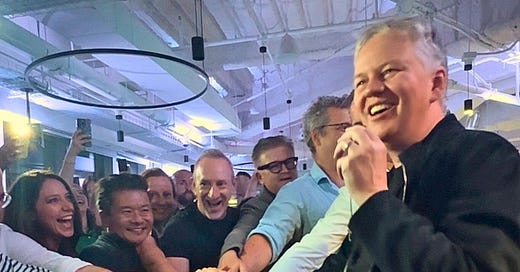Content Independence Day
It was 11:59 p.m. on June 30th, 88 floors above Manhattan, in the brand-new Cloudflare headquarters at One World Trade. The crowd wasn’t a typical tech audience. These were publishers, editors, media CEOs, and creators—people who’ve been watching, with increasing alarm, as AI systems rip through their work and spit it back out without credit, payment, or permission.
Matt Prince, Cloudflare’s co-founder and CEO, stood at the front of the room. Calm. Clear. With a big red button on a pedestal next to him.
At the stroke of midnight, the button would be pushed. And while it was symbolic—yes, metaphorical, it also wasn’t. Behind the scenes, Prince and his team had spent the past several months rewiring the infrastructure of the web. Working with the biggest sites, platforms, and publishers. Preparing to flip the default. And now, with the eyes of the industry on him, he was ready to say the thing most people had been thinking but hadn’t dared to say aloud.
“More and more people are consuming not the original content,” Prince said, “but content derived from the original. And that is incredibly terrifying for all of us.”
This wasn’t a theory. This was reality. LLMs and AI crawlers have been quietly extracting the work of journalists, creators, and independent publishers—without consent—and using it to train models that increasingly replace the very people they learn from. You don’t need to click the article anymore. The AI will summarize it for you, with no need to cite, no need to pay, and no incentive to support the source.
Prince didn’t speak in abstract terms. He brought the story home. “My wife and I own a small newspaper,” he said. “I see every day how hard the journalists work. They cover the news. They cover the community. And then that work gets scooped up by AI systems.”
“And it gets the facts wrong,” he added. “It gets the tone wrong. It gets the nuance wrong. And yet that is what more and more people are relying on.”
The old bargain—publish content and get traffic in return—has collapsed. “What was fair 30 years ago,” he said, “giving our content to Google in exchange for traffic, is no longer fair. That model is broken.”
He’s right. What used to be a functioning web economy has been replaced by a parasitic loop. AI crawlers take everything. Publishers get nothing. And users don’t know—or don’t care—that the synthetic answers they’re getting are built on the labor of thousands of unpaid writers, artists, and coders.
“We need to take back control over our content,” Prince said. “We need to take back control over what we give to the web.”
And that’s what Cloudflare is doing. Starting July 1st, Cloudflare will block AI crawlers by default across all new domains. That’s not a plugin. That’s not a legal threat. That’s a change to how the web actually works. AI companies will now have to explicitly request permission to access websites using Cloudflare’s infrastructure. Website owners, in turn, will get to decide: yes or no. Crawl or don’t. Pay—or get out.
This isn’t just about enforcement. It’s about shifting leverage. “AI companies know the fuel that makes their engines work is your content,” Prince said. “But none of them wants to be the first to pay for it. None of them wants to be the sucker.”
So they all keep scraping, quietly, competitively, under the table—hoping no one forces the issue. Until now.
“We need collective action,” Prince said. “Unless you pay for our content, you don’t get our content.”
And that was the point of the night. Not just flipping a switch. Not just blocking crawlers. But starting a chain reaction. Pushing the button at midnight wasn’t for show—it was a signal to publishers, creators, and platforms: this is the moment. This is the fight.
Prince looked out at the crowd. “Today, July 1st,” he said, “we declare that there cannot be any AI crawl without compensation. This is the first step.”
The countdown began. 10… 9… 8… The crowd leaned in. Cameras out. Hands started to pile on top of the red button—one by one, then all at once.
“Pushing this button may seem like a small thing,” Prince said as the clock ticked toward midnight, “but it’s the start of a really big revolution.”
And then it happened. Midnight. A click. A cheer. Content Independence Day began.
Not with a lawsuit. Not with a strike. But with code. With a line in the infrastructure. With a new default: No access without permission.
Cloudflare isn’t a media company. It’s not an AI lab. It’s not a law firm. It’s infrastructure. That’s what makes this moment powerful. They don’t need to win a court case to change behavior. They just have to update the settings.
And that’s exactly what they did.
If you create content - any kind of content - this matters to you. Because the game that’s been playing out quietly behind the scenes is about whether the next version of the web is built with creators, or on top of them. Whether the people who make the internet’s best work get to set terms, or just get scraped into oblivion.
July 1st is a beginning. A first step. But beginnings matter. So if you’ve been waiting for someone to draw a line, it just happened.
The web has a new rule: No free lunch. No consent, no crawl. And maybe, just maybe, a new economic model where creators have a say—and a share.
Happy Content Independence Day
.




